Stai usando la funzionalità di pubblicazione di Jetpack sul tuo sito?
Recentemente, navigando su Facebook, abbiamo trovato diverse persone che condividevano link in cui WordPress aveva sostituito il dominio del sito. Oltre a ciò, lo stato diceva anche: Michelle Schulp ha pubblicato un articolo su WordPress.
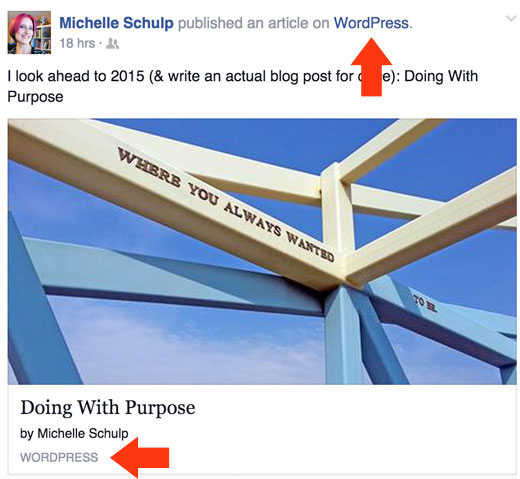
Questo era allarmante, quindi abbiamo deciso di indagare sul problema.
Quando fai clic sul link, ti porta al sito web. Tuttavia, quando fai clic su WordPress, ti porta a una pagina di registrazione di WordPress.com su Facebook.
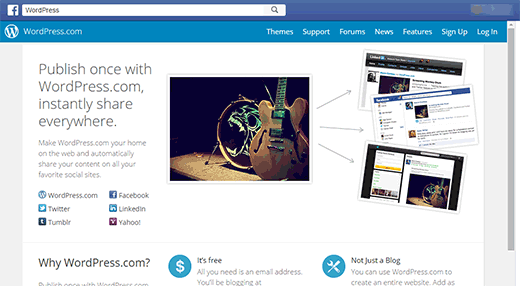
Abbiamo approfondito per vedere se questi siti fossero ospitati su WordPress.com, un servizio di hosting di blog. La maggior parte di essi non lo era. (vedi la differenza tra WordPress.com gratuito vs WordPress.org self-hosted)
Tuttavia, avevano tutti una cosa in comune. Tutti utilizzavano il plugin Jetpack, creato dalla società madre di WordPress.com, Automattic.
Per verificare le nostre scoperte, abbiamo deciso di installare Jetpack su un sito di prova. Abbiamo replicato il problema ed è collegato alla funzionalità di pubblicazione del plugin.
Durante la configurazione della funzionalità di pubblicazione, ti viene chiesto di connetterti con Facebook e concedere diverse autorizzazioni.
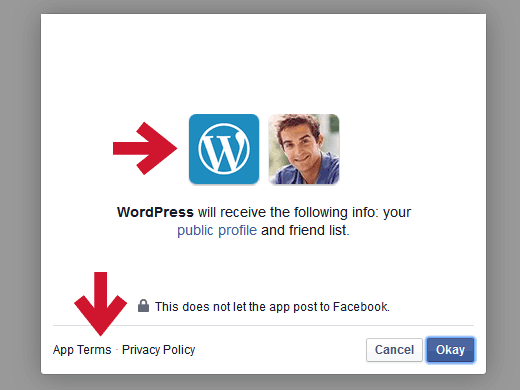
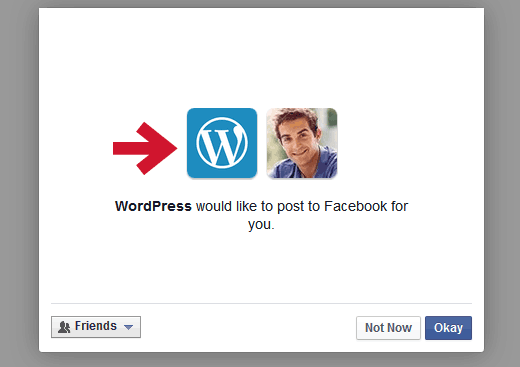
Durante il processo di autorizzazione, vedi il logo blu a forma di W invece del logo grigio a forma di W. In che modo è diverso?
Beh, uno è per WordPress.com (il servizio di hosting di blog) e l'altro è per WordPress.org (il software che tutti amiamo e usiamo).
Confuso, vero?
Spesso i principianti non conoscono la differenza, quindi pensano di autorizzare il proprio sito WordPress, non una piattaforma di terze parti come WordPress.com (vedi le relazioni e le differenze)
Inoltre, la dicitura durante tutto il processo non chiarisce che si sta autorizzando WordPress.com anziché il proprio sito effettivo. Vedere lo screenshot di conferma qui sotto:
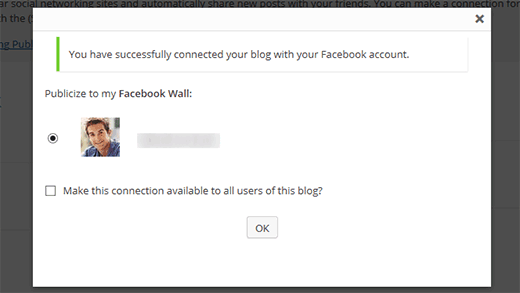
Ora, se si desidera che Publicize faccia ciò che dovrebbe fare (condividere automaticamente il proprio post quando viene pubblicato), questo è ciò che vedranno i tuoi utenti.
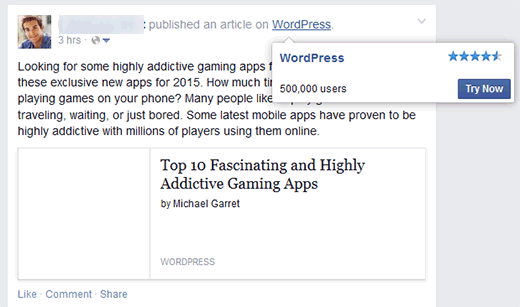
Abbiamo effettuato ulteriori ricerche per scoprire che non si tratta di un problema nuovo. È stato segnalato diverse volte dal 2013.
Considerando che Jetpack viene preinstallato e preattivato su diversi importanti provider di hosting WordPress per impostazione predefinita, questo dovrebbe essere corretto per diminuire la confusione tra WordPress.com e WordPress.org self-hosted.
Sebbene comprendiamo che Facebook abbia i suoi limiti, ci sono certe cose che possono e dovrebbero essere corrette per informare meglio gli utenti.
Innanzitutto, nei dati del link sotto il titolo del post, dovrebbe effettivamente mostrare il dominio dell'utente per promuovere il proprio marchio invece di mostrare WordPress. Come Jeremy del team Jetpack ha sottolineato nei commenti qui sotto, questo non è possibile a causa delle restrizioni di Facebook.
In secondo luogo, la dicitura che dice che Syed Balkhi ha pubblicato un articolo su WordPress dovrebbe essere riformulata per chiarire la confusione.
Uno degli utenti che ha segnalato il problema, ha offerto un suggerimento sulla dicitura: Vikas ha condiviso un link tramite Publicize invece di dire Vikas ha pubblicato un articolo su WordPress.
Un'altra alternativa potrebbe essere: ... ha condiviso un link tramite JetPack perché è quello che sta realmente succedendo.
Infine, nella finestra di dialogo di conferma, dovrebbe dire "hai collegato con successo Jetpack a Facebook" o "hai collegato con successo il tuo account Facebook a Jetpack". [Aggiornamento: Ticket #1476 creato da Jeremy]
Speriamo che questi suggerimenti contribuiscano a migliorare l'esperienza di Jetpack Publicize per gli utenti.
Jetpack è un ottimo plugin per i principianti che si spostano da WordPress.com a WordPress.org perché ti permette di mantenere molte delle fantastiche funzionalità di WordPress.com, dandoti al contempo la potenza e la libertà di WordPress.org.
Nota: L'obiettivo di questo post non è quello di iniziare una guerra di opinioni, ma piuttosto di incoraggiare la discussione e condividere la nostra opinione con la community. Abbiamo un immenso rispetto e apprezzamento per Automattic e per il lavoro che hanno svolto.
Se ti è piaciuto questo articolo, iscriviti al nostro Canale YouTube per tutorial video su WordPress. Puoi anche trovarci su Twitter e Google+.






Moinuddin Waheed
Ho usato il plugin Jetpack per molto tempo fin dai primi giorni (non lo uso più) e non ho mai saputo che fosse l'azienda, forse la sua società madre Automattic, dietro WordPress.com.
Hanno fatto un lavoro eccezionale per WordPress, ovviamente WordPress.org, e hanno aiutato tantissimi clienti con le loro fantastiche funzionalità.
Grazie a WPBeginner per averci fatto sapere come affrontare una cosa in modo così garbato senza offenderli.
inos
Ciao esperti! Sono Inos. Sono un vero principiante di WP. Ora sto iniziando a costruire il mio blog personale. Ho deciso di avere un hosting personale per il mio blog. Dopo alcune esperienze con WordPress.com, sono molto interessato ad alcune funzionalità innate di WordPress.com, una delle quali è la capacità di mostrare i nostri post del blog nei lettori WP. Ho installato Jetpack con successo, ma non vedo nessuno dei miei post del blog apparire nel lettore WP. Come si fa? Grazie..
Supporto WPBeginner
Ciao Inos,
Se l'URL del tuo sito web è cambiato dopo esserti spostato su un sito WordPress.org self-hosted, allora i tuoi utenti dovranno seguirti di nuovo. Vedranno i tuoi post nel lettore sotto Siti seguiti.
Amministratore
Jay
La parola wordpress è lì perché è l'app WP FB che viene utilizzata, non credo che si possa fare molto al riguardo. Se deve essere sostituita dal titolo del blog o dal titolo del sito, allora ci deve essere un modo per cambiare dinamicamente le impostazioni dell'app. Dubito che esista un modo del genere al momento
Sacha
È davvero subdolo!
Uso Jetpack per alcune delle sue migliori funzionalità, ma non mi è mai piaciuto Publicize.
WP to Twitter è meglio.
Rozz
Non usare Jetpack. Usa plugin scritti correttamente come Next Scripts. Sono più affidabili e configurabili.
Michele Pellegrino
Ciao, questo commento è per ROZ, volevo solo ringraziarti per aver consigliato il plugin NextScript per pubblicare il mio blog su piattaforme di social media, invece di JetPack. NextScript ha avuto senso e mi ha permesso di specificare il post che andava sulla mia Fan page e NON sulla mia pagina personale ed era molto facilmente configurabile. Molto apprezzato, e un plugin molto migliore!
Justin
Consigli un altro plugin oltre a Jetpack per pubblicare post WP sui social network?
Uso Jetpack e in realtà non ho molti problemi con la promozione di WordPress, ma mi è stato detto che "Jetpack in particolare è un plugin molto gonfio in quanto ha molte funzionalità e mini-plugin integrati. Il codice sorgente di Jetpack è ancora più grande del codice di Wordpress. Se non stai usando la maggior parte delle sue funzionalità, sarà meglio disattivarlo ed eliminarlo".
Uso solo Publicize e le icone social su ogni post del blog. Grazie in anticipo!
Asif2BD
Prima di tutto, @SyedBalkhi sei tornato di nuovo a Disqus!
Ultimamente JetPack continua a tornare per cose negative. È solo un sottosistema ricco di funzionalità (non lo chiamerò un plugin), ma probabilmente troppo in un unico pacchetto.
John Nadeau
Forgive me but now I’m confused I have a WordPress.org site self-hosted at http://LeLacAppelle.com. I use (and love) JetPack to publicize my posts to Facebook Page. I don’t see any reference to WordPress.com in my Facebook Page Posts EXCEPT when I’m logged in as an admin/manager to my Facebook Page. Even then it only says “Posted by Wordpress” in gray and a note upon hovering over the question mark “only people that manage this page can see who posted”. Can you look at my Facebook Page at the first two most-recent posts and tell me if you see any reference to WordPress.com ? https://www.facebook.com/TheLakeIsCalling OH WAIT… I’m posting from my WordPress.org Site > JetPack > to a Facebook “PAGE”. Is that the difference? If I were to post to my own “Personal” Facebook Profile/Page, then would I see the behavior you speak of ?
I have a WordPress.org site self-hosted at http://LeLacAppelle.com. I use (and love) JetPack to publicize my posts to Facebook Page. I don’t see any reference to WordPress.com in my Facebook Page Posts EXCEPT when I’m logged in as an admin/manager to my Facebook Page. Even then it only says “Posted by Wordpress” in gray and a note upon hovering over the question mark “only people that manage this page can see who posted”. Can you look at my Facebook Page at the first two most-recent posts and tell me if you see any reference to WordPress.com ? https://www.facebook.com/TheLakeIsCalling OH WAIT… I’m posting from my WordPress.org Site > JetPack > to a Facebook “PAGE”. Is that the difference? If I were to post to my own “Personal” Facebook Profile/Page, then would I see the behavior you speak of ?
Syed Balkhi
Non vedo nemmeno la pubblicazione su WordPress, quindi è possibile che sia solo per i profili personali rispetto alle pagine, dice solo che ha condiviso un link.
Jeremy
Sì, Facebook non offre la stessa funzionalità per le Pagine. Le Storie personalizzate vengono visualizzate solo sulle timeline personali.
Cameron Archibald
Spero che questo problema Jetpack vs Facebook possa essere risolto. Ma suppongo che il modo migliore per condividere articoli o post del blog sia farlo manualmente. A nessuno piace una macchina, dopotutto. Ho anche sentito dire che pubblicare manualmente rispetto ad automaticamente può essere scoperto da Google allo stesso modo in cui può essere scoperto dagli utenti e il SEO Juice viene distribuito in modo diverso.
Khürt L. Williams
"... pubblicare manualmente rispetto ad automaticamente può essere scoperto da Google". Mi piacerebbe vedere qualcosa a supporto di ciò. Seriamente, a meno che l'automazione non includa una sorta di identificatore, questo non è possibile. Né penso che a Google importi. Perché dovrebbe?
takien
Nessun problema per me.
ebarney
Questa è una domanda un po' tangenziale, ma la funzione di pubblicazione non è una "condivisione implicita" tramite un'app, secondo l'algoritmo di Facebook?
Per le pagine che gestisco, abbiamo smesso di usare la pubblicazione tramite JetPack per i contenuti del blog dopo le modifiche all'algoritmo della primavera scorsa che svalutano la condivisione implicita tramite app (http://newsroom.fb.com/news/2014/05/news-feed-fyi-giving-people-more-control-over-when-they-share-from-apps/)
Copiare manualmente i link degli articoli e utilizzare il debugger dei link di Facebook per assicurarsi che funzionino come vogliamo ha il miglior effetto sulla visualizzazione effettiva dei contenuti: https://developers.facebook.com/tools/debug/
Khürt L. Williams
Il link newsroom.fb.com non ha funzionato.
Come si presenta il tuo UL in modo che venga visualizzato diversamente quando condiviso tramite Jetpack rispetto a un copia e incolla?
ebarney
Penso di aver chiuso la mia precedente risposta senza pubblicarla, scusa
Incolla questo dopo l'URL base newsroom.fb.com e vedi se funziona per te: /news/2014/05/news-feed-fyi-giving-people-more-control-over-when-they-share-from-apps/
La condivisione tramite Jetpack viene meno enfatizzata nei feed di notizie dei tuoi lettori rispetto all'utilizzo dello stesso URL e al suo copia-incolla manuale nella casella "condividi questo" su una pagina di Facebook, questo è ciò che fa la modifica dell'algoritmo di FB, per quanto ne so.
Non un link diverso, solo un trattamento diverso del link in base a dove/come viene inviato nel software di FB.
A proposito dell'algoritmo di FB e delle pagine, ci sono molte altre preoccupazioni per i proprietari di pagine riguardo a come i contenuti che condividi NON vengono visualizzati – non correlato a Jetpack, ma problemi di contenuto: http://newsroom.fb.com/news/2014/11/news-feed-fyi-reducing-overly-promotional-page-posts-in-news-feed/
Paul Ames
Ottima scoperta, grazie, odio comunque Facebook per quella parte.
Alastair McDermott
Sarò onesto, ho pensato che fosse pura autopromozione da parte dei ragazzi di WP.com. Ma come al solito in queste cose c'è un'altra opzione: stanno usando un'app comune per rendere la condivisione più facile e non confondere la questione chiedendo le chiavi. (Mi scuso per aver pensato il peggio, ragazzi di Jetpack)
La mia preferenza è che documentino il comportamento attuale nell'app per essere un po' più trasparenti sulle cose e dare la possibilità di utilizzare un'app personalizzata alternativa. Ma questo aggiunge una parte significativa di funzionalità e immagino che il team Jetpack sia molto severo riguardo a qualsiasi riga di codice aggiuntiva che venga inserita per combattere un potenziale bloat.
Jeremy
Ciao!
Lavoro per Automattic e faccio parte del team Jetpack.
Prima di tutto, grazie per il feedback!
Questo può effettivamente essere un problema confuso. Come hai menzionato, Facebook ha le sue limitazioni, rendendo le cose complicate o a volte impossibili quando si vuole personalizzare l'output di un aggiornamento pubblicato da un'app.
To use your own site name or brand there, you’d have to use your own Facebook app. Since Jetpack aims to help you easily push your content to multiple Social Networks, we won’t ask you to create a Facebook developer account, create an app, change the app settings, and copy app ID and secrets somewhere in your WordPress dashboard. That’d be the opposite of “easy”
Non è qualcosa che puoi cambiare, sia che tu usi Jetpack o qualsiasi altra app per pubblicare sul tuo profilo Facebook. Facebook stesso crea l'aggiornamento e la frase di condivisione in base alle impostazioni dell'app e ai tipi di oggetto. Puoi leggere di più qui:
https://developers.facebook.com/docs/opengraph/creating-custom-stories/
Quella sarebbe effettivamente un'opzione. In passato diceva effettivamente "WordPress.com" invece di "WordPress". L'abbiamo cambiato in "WordPress" perché gli utenti Jetpack trovavano confuso vedere "WordPress.com" lì.
Abbiamo considerato anche altre opzioni, tra cui "Jetpack". Purtroppo al momento non è possibile a causa del modo in cui è costruito il nostro sistema, poiché utilizziamo un'unica app per i siti WordPress.com e per i siti Jetpack.
È ancora sulla nostra roadmap, però! Stiamo attualmente lavorando a molti miglioramenti per il modulo Publicize e rilasceremo queste modifiche presto in un aggiornamento che abbiamo soprannominato "Publicize Next". Puoi dare un'occhiata ad alcune delle cose su cui stiamo lavorando qui:
https://github.com/Automattic/jetpack/milestones/Publicize%20Next
Non sono sicuro di aver capito il tuo suggerimento qui. Intendi sostituire "il tuo blog" con "Jetpack"?
Lo faranno! Siamo sempre felici di iterare e migliorare le cose in base al feedback degli utenti.
Se trovi bug, puoi anche contattarci direttamente o creare un problema su GitHub!
Syed Balkhi
Grazie per la risposta dettagliata Jeremy. Capisco le limitazioni tecniche sul perché un utente non possa cambiare il verbo "pubblicato un articolo su WordPress".
Il mio punto è che voi (team Jetpack) potete, in qualità di sviluppatori di app, rappresentare accuratamente l'azione, e sono lieto di vedere che ci state già lavorando.
This confusion can be solved if Jetpack uses a separate Publicize app for .org sites rather than using the main WP.com app — this keeps the “easiness” entact for users
Per quanto riguarda la finestra di dialogo di conferma, attualmente dice che il tuo blog è ora collegato a Facebook. Questo implica una connessione diretta, ma c'è una terza parte coinvolta (attualmente WordPress.com).
Penso che un messaggio di conferma chiaro direbbe: "Hai collegato con successo il tuo account Facebook a Jetpack".
Questo sarebbe perfetto se/quando ci sarà un'app standalone per Jetpack.
Ancora una volta grazie per la tua risposta e non vedo l'ora della nuova versione.
Jeremy
Ho aggiunto qui il tuo suggerimento e lo prenderemo in considerazione per un futuro aggiornamento di Jetpack:
https://github.com/Automattic/jetpack/pull/1476
Syed Balkhi
Thanks for your consideration Jeremy
George Stephanis
> This confusion can be solved if Jetpack uses a separate Publicize app for .org sites rather than using the main WP.com app — this keeps the “easiness” entact for users
Ma se lo facessimo, come risolverebbe la tua affermazione che stiamo 'abusando dei marchi degli utenti' per promuovere Jetpack? Si tratta solo di cambiare la parola da WordPress a Jetpack, che è ancora più marchiato per noi rispetto al generico WordPress.
Syed Balkhi
George, avere il nome dell'app sullo stato è un comportamento naturale su Facebook, lo capisco.
Il problema che sta creando confusione qui è il termine "WordPress" che ce ne sono due. Il software open-source e la società di hosting WordPress.com
Anche la scelta della parola sull'oggetto azione della tua app aumenta la confusione:
"pubblicato su"
Se l'azione dice pubblicato su WordPress.com (non sarebbe una descrizione inaccurata dell'azione perché l'utente non lo sta facendo?) — Proprio come dire pubblicato su WordPress mostrando l'app wp.com è altrettanto inaccurato.
Implica che l'utente sta pubblicando il suo articolo su WordPress.com, il che è un'affermazione fuorviante.
Se descrivi l'azione in modo accurato:
XYZ ha condiviso un link tramite Jetpack, allora non stai ingannando nessuno.
wycks
> That’d be the opposite of “easy”
A proposito, uso un'app non WordPress che offre all'utente 2 opzioni di pubblicazione.
Opzione 1: Pubblicazione facile che utilizza le impostazioni del plugin menzionate sopra.
Opzione 2: Dominio personalizzato e impostazioni dell'app, questo richiede circa 5 minuti di lavoro e, ad essere onesti, devi solo copiare/incollare le chiavi dell'app e compilare al massimo 2 campi e salvare.
Dovresti davvero considerare di offrire entrambe le opzioni ai tuoi utenti. Facile non significa quello che pensi e non serve davvero a tutti gli utenti.
Jeremy
Questo è qualcosa che sicuramente prenderemo in considerazione quando lavoreremo su “Pubblicizza Prossimamente”, come ho menzionato sopra. Se dovessimo fornire tale opzione, probabilmente dovremmo mantenerla semplice, per evitare di ingombrare la dashboard con altre opzioni. Ma possiamo vedere se possiamo fornire dei filtri per farlo. Ho creato un problema per tenere traccia di questa idea qui.
Keep in mind that all communication with Facebook is done via WordPress.com, though, so it makes things a bit more complicated for us as we’d have to build a new system to allow you to post from your site to your Facebook app without going through WordPress.com and our app. I’m not saying it’s impossible, but at that point, and since there are already plugins that do that well, it might be best to use one of these plugins instead. You don’t have to use each and every Jetpack module, it’s perfectly fine to deactivate a module and use something else when you need something different
“Facile” potrebbe non essere stato il modo migliore per descrivere quello che avevo in mente.
Il modo in cui funziona Pubblicizza oggi è sicuramente più veloce da configurare rispetto a se dovessi creare la tua app. È una soluzione chiavi in mano, come la maggior parte degli altri moduli Jetpack.
You could get by by copying and pasting things around and following instructions, but you would also become responsible for your own app, and for keeping up with any changes Facebook may make to the system and the interface later on. It works, but it’s not for everyone.
Khürt L. Williams
Penso che facile in questo contesto sia più legato alla comprensione — facile da capire o “Non ho idea di cosa sia una chiave API di Facebook o come ottenerne una. Datemi il pulsante facile”.
L'opzione 2 è tutto gergo tecnico. Facile per te è un ostacolo per gli altri.
Jeff Yablon
Questo è… inquietante, ma non sorprendente. È anche una notizia vecchia.
Parlando in modo pragmatico, posso difendere WordPress, nello stesso modo in cui potrei difendere Facebook quando ti inventano un indirizzo email o Disqus, il servizio che elabora questi commenti, quando ti dirottano il succo SEO.
Parlando in modo un po' più spietato, posso dire qualcosa come "ti danno qualcosa gratis, e mentre probabilmente hanno divulgato le politiche all'interno di termini di servizio densi che né tu né nessun altro avete mai letto, hanno divulgato, ... ehm ... giusto? Quindi arrangiati."
Ma parlando onestamente, temo che la mia reazione torni principalmente all'angolazione "non sorprendente". Non sorpreso che l'abbiano fatto, e non sorpreso che tu non ti sia fermato a considerare che sarebbe successo.
Nel suo nucleo, è di questo che si occupa http://thewordpresshelpers.com. E mentre criticare WordPress/Automattic, et. al. non è il punto, quello che ci interessa è criticare tutti per tutto; La comunità di WordPress è probabilmente più grande e più importante di Facebook o di qualsiasi altra nazione digitale... e tutti i suoi cittadini hanno la responsabilità di agire come membri coinvolti e informati della comunità.